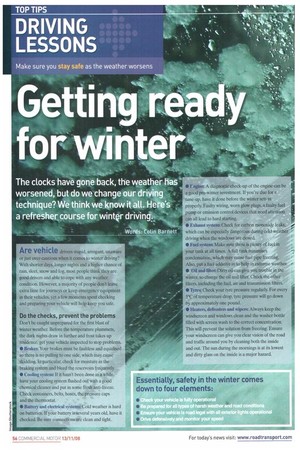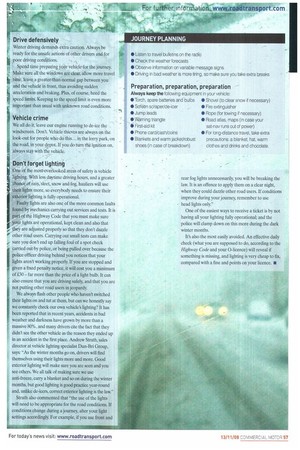The docks have gone back, the weather has worsened, but
Page 56

Page 57

If you've noticed an error in this article please click here to report it so we can fix it.
do we change our driving technique? We think we know it all. Here's
a refresher course for wintcr driving: *-01* Are vehicle drivers stupid, arrogant, unaware or just over-cautious when it comes to winter driving? With shorter days, longer nights and a higher chance of rain, sleet, snow and fog, most people think they are good drivers and able to cope with any weather condition. However, a majority of people don't leave extra time for journeys or keep emergency equipment in their vehicles, yet a few moments spent checking and preparing your vehicle will help keep you safe.
Do the checks, prevent the problems
Don't be caught unprepared for the first blast of winter weather. Before the temperature plummets, the dark nights draw in further and frost takes up residence. get your vehicle inspected to stop problems.
• Brakes: Your brakes must be faultless and equalised so there is no pulling to one side, which may cause skidding. In particular, check for moisture in the braking system and bleed the reservoirs frequently.
• Cooling system: If it hasn't been done in a while, have your cooling system flushed out with a good chemical cleaner and put in some fresh anti-freeze. Check containers, belts, hoses, the pressure caps and the thermostat.
• Batter) and electrical systems: Cold weather is hard on batteries. If your battery is several years old, have it checked. Be sure connections are clean and tight. — • Engirm A diagnostic check-up of the engine can be a good pre-winter investment. If you're due for a tune-up, have it done before the winter sets in properly. Faulty wiring, worn glow plugs, a faulty fuel pump or emission control devices that need attention can all lead to hard starting, • Exhaust system: Check for carbon monoxide leaks, which can be especially dangerous during cold weather driving when the windows are closed.
• Fuel system Make sure there is plenty of fuel in your tank at all times. A full tank minimises condensation, which may cause fuel pipe freezing. Also, put a fuel additive in to help in extreme weather.
• Oil and filter: Dirty oil can give you trouble in the winter. so change the oil and filter. Check the other filters, including the fuel, air and transmission filters.
• Tyres: Check your tyre pressure regularly. For every 5"C of temperature drop, tyre pressure will go down by approximately one pound.
• Heaters, defrosters and wipers: Always keep the windscreen and windows clean and the washer bottle filled with screen wash to the correct concentration. This will prevent the solution from freezing. Ensure your windscreen can give you clear vision of the road and traffic around you by cleaning both the inside And out. The sun during the mornings is at its lowest And dirty glass on the inside is a major hazard..
Drive defensively
Winter driving demands extra caution. Always be ready for the unsafe actions of other drivers and for poor driving conditions.
Spend time preparing your vehicle for the journey. Make sure all the windows are clear, allow more travel time, leave a greater-than-normal gap between you and the vehicle in front, thus avoiding sudden acceleration and braking. Plus, of course, heed the speed limits. Keeping to the speed limit is even more important than usual with unknown road conditions.
Vehicle crime
We all do it, leave our engine running to de-ice the windscreen. Don't. Vehicle thieves are always on the ilook-out for people who do this... in the lorry park, on the road, in your depot. If you do turn the ignition on. always stay with the vehicle. Don't forget lighting One of the most overlooked areas of safety is vehicle lighting. With less daytime driving hours, and a greater chance of rain, sleet, snow and fog, hauliers will use their lights more, so everybody needs to ensure their exterior lighting is fully operational.
Faulty lights are also one of the more common faults found by mechanics carrying out services and tests. It is part of the Highway Code that you must make sure your lights are operational, kept clean and also that they are adjusted properly so that they don't danle other road users. Carrying out small tests can make sure you don't end up falling foul of a spot check carried out by police, or being pulled over because the police officer driving behind you notices that your lights aren't working properly. If you are stopped and given a fixed penalty notice, it will cost you a minimum of £30-. far more than the price of a light bulb. It can also ensure that you are driving safely, and that you are not putting other road users in jeopardy.
We always flash other people who haven't switched their lights on and tut at them, but can we honestly say we constantly check our own vehicle's lighting? It has been reported that in recent years, accidents in bad weather and darkness have gown by more than a massive 80%, and many drivers cite the fact that they didn't see the other vehicle as the reason they ended up in an accident in the first place. Andrew Strath, sales director at vehicle lighting specialist Dun-Bri Group, says: "As the winter months go on, drivers will find themselves using their lights more and more. Good exterior lighting will make sure you are seen and you see others. We all talk of making sure we use anti-freeze, carry a blanket and so on during the winter months, but good lighting is good practice year-round and, unlike de-icers, correct exterior lighting is the law."
Strath also commented that "the use of the lights will need to be appropriate for the road conditions. If conditions change during a journey, alter your light settings accordingly. For example, if you use front and rear fog lights unnecessarily, you will be breaking the law. It is an offence to apply them on a clear night, when they could dazzle other road users. If conditions improve during your journey, remember to use head lights only."
One of the easiest ways to receive a ticket is by not having all your lighting fully operational; and the police will clamp down on this more during the dark winter months.
It's also the most easily avoided. An effective daily check (what you are supposed to do, according to the Highway Code and your 0-licence) will reveal if something is missing, and lighting is very cheap to fix, compared with a fine and points on your licence. le












































































































































































